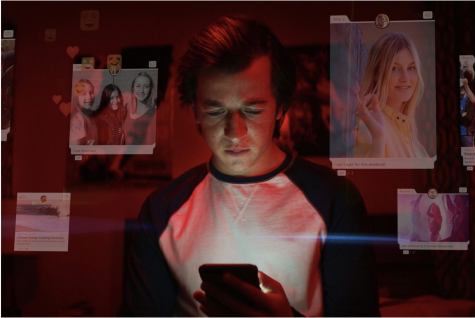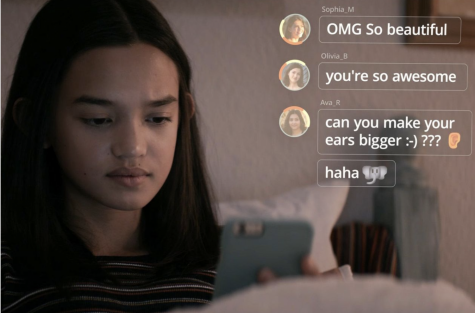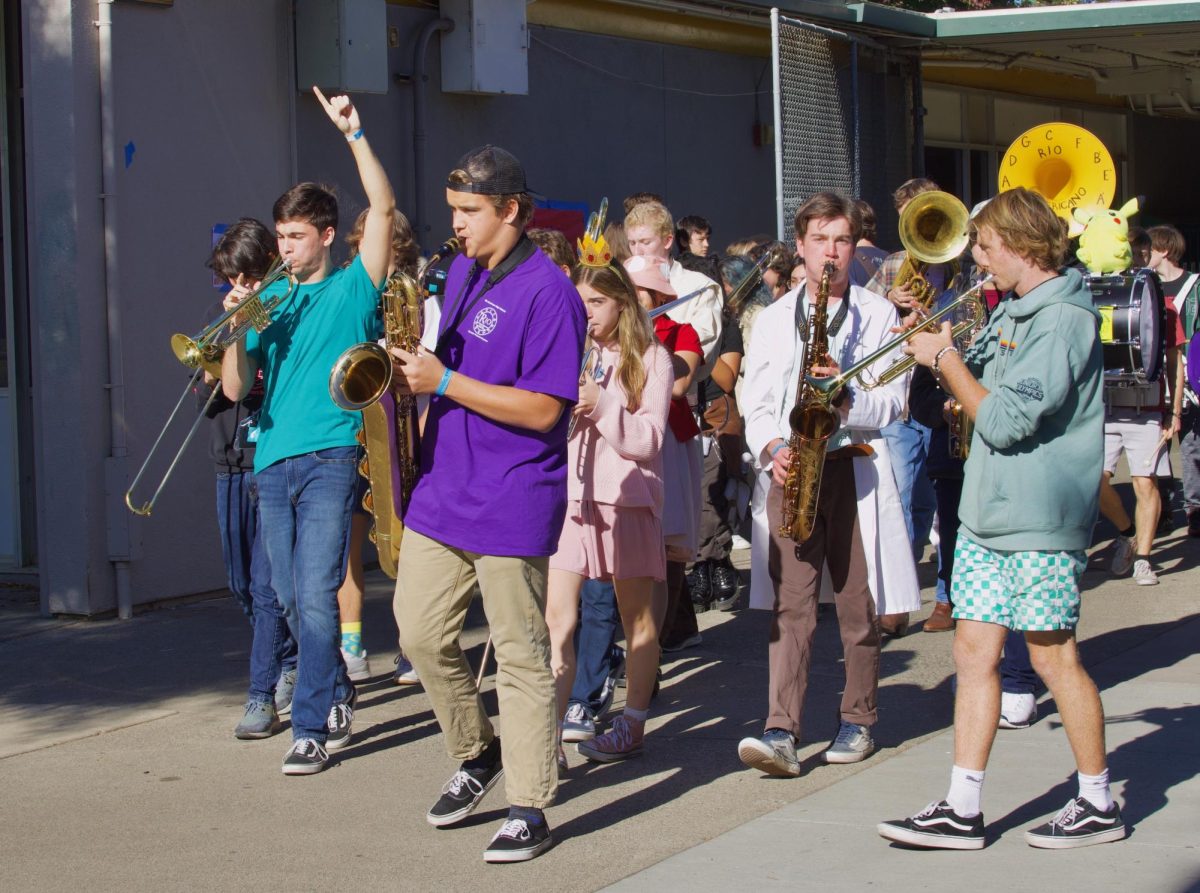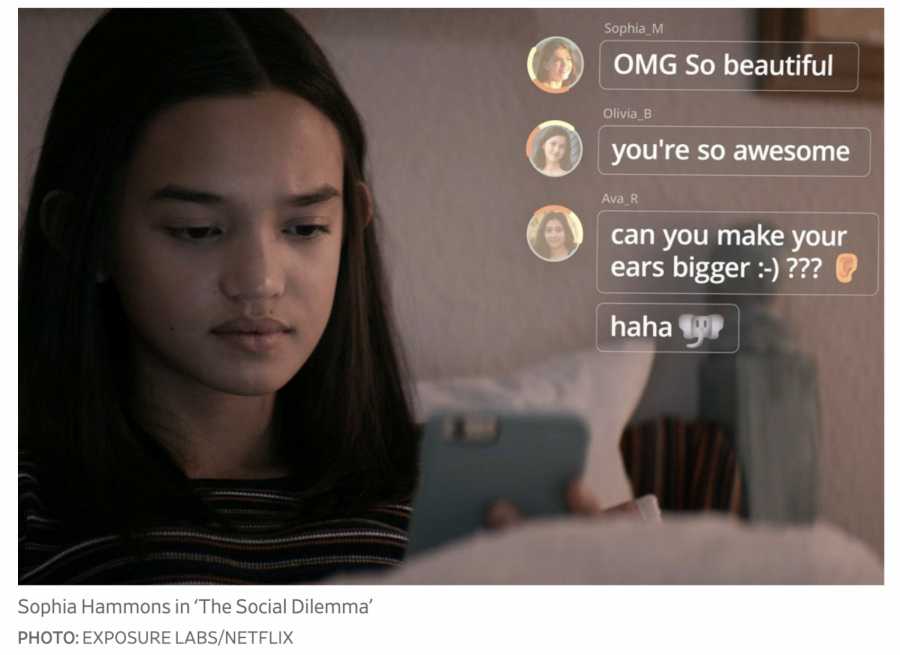Put Down Your Phone–If You Can–And Watch “The Social Dilemma”
Movie Review: Alarming documentary exposes addictiveness and danger of phones and social media
Every day, I wake up and before my eyes even adjust to the morning light or I drag myself out of bed, I instantly reach for my phone.
My fingers almost unconsciously tap into Instagram, Snapchat and Tik Tok, where I begin scrolling aimlessly through my feeds. Scrolling, liking, tapping. Scrolling, liking, tapping. I then refresh, and instantly, I am bombarded with a new set of pictures and videos, which seem to be weirdly tailored just for me.

Why are we constantly reaching for our devices, allowing them to consume our time and our thoughts? What makes it so painfully difficult for us to stay off our phones for more than a couple of hours? If you are ever plagued by these thoughts, watching the documentary, The Social Dilemma, will uncover answers to these questions–and they will freak you out.
This enlightening 93-minute film, which recently dropped on Netflix, scrutinizes the hidden truths behind social media through various narrative devices that keep viewers engaged. Candid and forceful, “The Social Dilemma” explores the depths that tech companies plumb to spy on us, manipulate us, and use our own human nature to control who we are.
Jeff Orlowski, producer and director of “Chasing Ice” (2012), for which he won an Emmy, now focuses his attention on educating viewers to the secret designs of social media, bringing together a group of former high-level employees from some of the most powerful tech companies including Google, Twitter, Facebook and Instagram. The very people who helped create these platforms we can’t live without, now recognize and fear the social media monster that is impossible to control.

Most of us willingly allow ourselves to be consumed by our devices, completely unaware of what is happening with every tap of our finger. We learn from The Social Dilemma that the goal of these tech companies is ensuring we spend as much time as possible on our phones, as every precious minute of our day is another data point and another dollar gained for them.
As you watch the documentary, you will discover that these companies are extremely sophisticated, predicting our present and future actions, as well as carefully monitoring and storing all of our data, as we blindly scroll through our pages. In one disturbing interview, professor Shoshana Zuboff, of Harvard Business School, cautions that, “they have more information about us than ever imagined in human history.”
This data is used to curate virtual worlds made to specifically target our wants and desires. For most of us, these wants and desires are largely harmless, but as noted in the documentary, alarmingly 64 percent of people who joined extremist groups on Facebook, were guided there by these powerful algorithms.
The Silicon Valley insiders who helped create the algorithms that give each user information (or misinformation) reflecting their likes, now worry about disastrous consequences of everybody having their own version of reality. Tech pioneer Jaron Lanier cautions, “If we go down the status quo for, let’s say, another 20 years, we probably destroy our civilization through willful ignorance.”
Orlowski uses not only the more traditional documentary style of informative interviews with experts in the field; he also weaves a narrative of a realistic American family struggling to connect with one another, as their addictions to social media get the best of them. This fictional strand, which illustrates problems ranging from a teenage girl becoming depressed because of negative comments on her feed to a boy getting drawn into extreme politics, shines a light on the real-life effects that social media has on friendships and family relationships.
It is clear that “The Social Dilemma” wasn’t made in hopes of convincing every viewer to delete their social media accounts or throw away their phones. Instead, Orlowski’s goal is to knock some sense into us, forcing us to recognize that we have been manipulated and brainwashed by tech companies without consciously knowing.
Tristan Harris, former Google design ethicist, notes that technology is confusing, as it is both, “simultaneously utopia and dystopia.” While these technologies have opened a window into an amazing interactive playground for all of its users, it comes at a steep price. Problems such as the complete loss of privacy, as well as the inescapable feeling of obligation to always be present on these platforms confront us all.
Although this documentary showcases all of the doom and gloom regarding social media, it instills hope for our future, as well. “The Social Dilemma” suggests that there is still time to modify our personal habits and reign in the negative aspects of these platforms and their consequences. Knowledge is a powerful tool, and by watching this documentary you will become more aware of your addicting habits. Personally, “The Social Dilemma” has forced me to rethink my entire outlook on social media. I have become more mindful of limiting my time spent on social media, as well as breaking the attachment I have created for my phone.
I believe we all need this wake up call, as it is extremely easy to fall victim to the manipulation of these platforms.
Take time out of your day, turn off your phone–which may be a struggle–and instead, watch “The Social Dilemma,” which will explain exactly why it was so hard for you to put down your phone in the first place.

































Metzli Lemus • Oct 20, 2020 at 4:36 PM
Initially watching the documentary, it was scary how much ones mind could be influenced by our phones and social media. I was not so scared for myself, as I normally regulate myself on my phone and social media, mostly to use it to communicate, or to catch up on recent news, but what did frighten me, was thinking about how my nephews, nieces and younger cousins were all using their phones and are possibly experiencing a similar addiction as was explained in the film. Already when we are with family, they are all hooked onto their phones and we have to bribe them off of them. Now it makes nearly perfect sense, it is because of the big companies that are making these apps and games addicting to people. I think everyone catches themselves at some point, where they then put themselves in check because of how long we’ve been on our phones, but these younger kids don’t have that self regulation. It now falls on us to step away from our phone addictions to ensure that the next generation doesn’t fall under the same spell.
Faith McNamee • Oct 19, 2020 at 10:18 PM
Sometimes I think it’s easy to be naive and just look at social networking sites as a way to escape. They are seen as used for pleasure and made for people to enjoy. Even I find myself forgetting that they are used first and foremost to make money. What this documentary brought to my attention was exactly how manipulative these sites are. Humans associate social media with culture, and as said in the documentary, “The very meaning of culture is manipulation.” The goal of social media is to make money, and the means is manipulation. Every social media site is manipulating the user to become closer and closer to what they want to be, which is the perfect customer. I didn’t realize how much psychology went into technology. The way it was described, technology plus psychology gives way to persuasive technology. This persuasive technology modifies users’ behavior to what the company wants. This stuck out to me because it is similar to something I learned about psychology. Technology is very similar to gambling in the sense that it is on a variable interval schedule. No one knows when they are going to get likes, how many likes, when their favorite influencer is going to post, or a number of unknowns that keeps the user addicted to their phone. The bottom line is that social media exploits vulnerabilities in human psychology, and manipulates the user to what they want, which is a truly scary thing.
Ajeeth Iyer • Oct 19, 2020 at 9:43 PM
This documentary certainly opens our minds to the daily intrusive and manipulative methods that social media companies employ to addict their users. This sounds — as you pointed out, Angie — like it came straight out of a dystopian novel. However, that isn’t the most disturbing part. The fact that most people don’t know or understand the “brainwashing” methods that social media companies use to attract more users and profit is truly distressing. Nevertheless, we have to thank this documentary, and other similar efforts by others, for bringing greater awareness to such a worrying and largely unnoticed problem.
Madison Flores • Oct 19, 2020 at 3:49 PM
I very much agree. After watching The Social Dilemma I realized that I need to spend less time on social media (and on my phone) and more time with my family and the people around me. I feel that all of the people who were interviewed in the documentary were right, social media has taken over our lives, our minds, and our beliefs. All we ever do these days is sit on our phones and are on Snapchat, Instagram, Facebook, Pinterest, Reddit, TikTok, and basically any social media app there is. Something that made me scared was to see that people are actually watching us and knows what we are like, what we send to people, what we watch, what we post, etc. I hope that lots of people will watch this documentary and realize how much it is controlling their lives and their future. I hope that it will make them not want to go on social media as much and be aware of what they say and post.
GraceAnn Lesser • Oct 19, 2020 at 3:51 AM
Learning about the extent to which tech developers take advantage of human psychology was a little frightening. Even though I already sort of knew this was happening, I was unaware of how intentional it is.
Sydney Gerety • Oct 18, 2020 at 10:50 PM
I’m starting to thank my parents for setting a phone curfew for me every night. this resists my temptation to look at my phone in the early morning, instead just waking up social media free. Although this doesn’t stop me from getting immersed in this other world very soon. In the documentary, when it was said that the creators themselves are afraid of social media, it put into perspective just how much this has taken over our lives. I hope that a solution can be found soon that will satisfy everyone.
Lydia Ellis • Oct 18, 2020 at 10:33 PM
I agree with your statement that this documentary is a necessary wake up call for everyone. I also find myself constantly drawn to my phone to check different social media platforms, and watching this documentary has made me realize the effects that these apps have. After watching this, I am also motivated to spend less time online.
Zach Carson • Oct 18, 2020 at 10:27 PM
I agree, that all this stuff with social media is horrible and is totally corrupting and destroying society. I dont really feel to affected by it though. the only times i am really on my phone is for school or youtube. but i sure would like to be on my phone even less than i am now
Daniel Norris • Oct 18, 2020 at 10:03 PM
After watching the documentary I must admit that I am worried about the effect that social media is having on our world. It seems like every day we get further and further apart on issues that should be relatively agreed upon. Things such as climate change, vaccines, and political issues. I think that this is a result of social media and that is worrying.
Maddie Bister • Oct 18, 2020 at 9:23 PM
It is baffling that we live in a generation where our happiness could be based off how many likes we get or if people compliment you on social media. I find myself agreeing with you when you said aimlessly scrolling, tapping, liking and I wish it wasn’t like that. I am definitely going to be more aware of social media because of this.
Henri DeCocker • Oct 18, 2020 at 6:27 PM
After watching the documentary I realized that the problem facing us about social media was much bigger than I previously thought. I found it helpful that the documentary looked at the first hand perspectives of the people who created and worked on these programs to truly explain the importance of the problem at hand. I had no clue that the main problem was manipulation of the products users. With tracking of every movement on the internet no one is exempt and companies use that data to their advantage. It truly is the selling of ones attention to the highest bidder. This effects everyone who uses their products and the problem was manufactured by these companies and were not caused by accident. The problem is evident but the only ones who can stop it are the ones who created it. This documentary is a great call to action for executives to wake up and realize the real world affect their programs are having on people.
Mikael Eury • Oct 18, 2020 at 4:49 PM
I used to have the same beliefs as what the documentary said about social media. It is taking our data and that it’s harmful to us. So I did not get a social media account until this year. I got it around February-March, I do not remember the exact date. And once I got it, I thought it was amazing, to be able to talk with friends and to have interesting content right there in my hand at anytime. Eventually I forgot what I hated about social media and just enjoyed it consuming it. Until I saw Social Dilemma which just brought back all of my thoughts from 8 months ago. Social media is addicting and you get hooked onto it very quickly. So I think I will try to stop using social media as much as before. Mostly YouTube, which I spend hours on just watching content.
Sam Thompson • Oct 18, 2020 at 3:45 PM
I do agree that social media and modern technology has had a lot of negative effects on the human mind and modern society; however, technology has had many positive effects as well. Keeping all of that in mind, how do humans learn how to use technology to a beneficial degree and not get sucked into it. A lot of people after watching the documentary decided they were going to delete all social media or get rid of their devices, but in our world technology is used in everyday life a lot. As a society we need to decided how much technology is really needed in our daily lives and learn how to use technology to benefit us, not the other way around.
Michala Rapozo • Oct 18, 2020 at 2:16 PM
I also agree and will confess that I wake up every morning and check my phone. I spend copious amounts of time on my phone/ social media each and every day. When watching The Social Dilemma it really showed me how much time and money I am giving these apps. I have always known that social media can have dangerous effects on people, but it wasn’t until I watched this film when it was set into perspective and I saw for myself how people were and are still being effected. Though I know it will take time to veer away from my habit of checking social media constantly, I hope within the future I will be able to delete my social media apps.
Dillon Gordon • Oct 18, 2020 at 2:42 AM
I not only watched this documentary once but twice; then I recommended it to all those around me because I considered it with much importance. This documentary solidified my previously biased standpoint opposing social media. To understand that large tech corporations have, with good intentions, created a network of social media that intentionally affects your cognitive thought frightened me. The producers compared these “networks of connection” to drugs as they referred to the term “usage” which is applied to them both. They want to influence the average user to increase the usage of their product to popularize and monetize it. As opposed to it as I am, I love the connectivity, friendships, and relationships that social media and technology have fostered or rekindled; they have done things that were unimaginable in the 20th century. But, if humans continue to develop technology at this exponential rate, we are bound to end up like the people in Wall-E. I agree in the message of this documentary that complexity of this situation is difficult to describe but it is an extremely pressing issue. With that in mind, I have deleted all forms of social media, something I have tried to do in the past multiple times, and my productivity has skyrocketed along with my happiness. This documentary was enlightening and very much needed.
Natalia Lopez • Oct 17, 2020 at 10:08 PM
I agree. I wake up every morning and go straight to my phone. While watching the documentary, it made me realize how addicting social media is. After watching the documentary, I started to be more aware of how much time I would spend on my phone. It is scary how much it impacts our life.
Alyssa Newberry • Oct 17, 2020 at 8:29 PM
This Documentary was eye opening in a way where it showed me how much society has been shaped by social media. After watching this, I’ve decided to limit my social media intake and I am becoming more aware of my screen time.
Evie Hofioni • Oct 17, 2020 at 3:38 PM
This documentary made me realize the dangers of social media in a whole new perspective. I am glad I watched it so I can be more aware when it comes to technology and social media. Turning off our phones is a thing us teenagers struggle with today and I agree that we should do that more often, especially in stressful times like these.
Aaliyah Silva • Oct 17, 2020 at 1:03 PM
Watching the film felt like watching a horror movie. It was terrifying to know that I am addicted, as many others are, and that we have been manipulated to do so. I can think back to all the time I have wasted just scrolling pointlessly through Instagram. It seems to very hard to escape the maze they placed us in. This did help me feel more motivated to uninstall or put screen reminders on my phone to get me spending less time, eventually I hope to leave social media; however it is very difficult during a time where you can hardly see face to face.
Ryan Witte • Oct 17, 2020 at 12:49 PM
I think that a lot of the things that the Social Dilemma and this articles talk about are entirely true. With strategies like the “bottomless bowl” of news feeds and youtube these companies can drain away our time. Especially for teenagers this problem is a huge one as we spend hours each day wasting time instead of doing something meaningful.
Keshav Sreedharan • Oct 17, 2020 at 9:34 AM
The documentary was eye-opening. Everything has a downside but technology is moving the world forward. It’s useful and making a lot of things better for people around the world. The scariest thing was how companies are actively trying to make their apps more addicting. This makes sense from a business standpoint but they continue to make apps more addicting. If tech companies get a big backlash from the public, they might slow down and think twice about how addicting their app is. I believe it will take a large opposition to really convince companies that they have to pay attention to this: especially where the money’s involved. It can’t be a slow burn. In the future, things can get better if more and more people need to be aware of the things discussed in the documentary.
Farah Ghazanfari • Oct 16, 2020 at 4:07 PM
I think this film is important since it goes into an in-depth discussion of the rise of social media and the damage it has brought upon our society, all while bringing a focus on how it exploits participants for the purpose of economic gain by surveillance and data mining. It brings up the point that the design of these companies is meant to build an addiction, and is used as a tool in politics. Also, it has detrimental effects on mental health, especially in teens as seen by the rise in suicide rates.
Lilah Cruz • Oct 15, 2020 at 10:15 PM
I’ve heard before that there are people within these popular media companies that are hired to create and predict what consumers want and will do. Although I knew this information, I was shocked to hear from former employees that worked at these companies. They knew what they were doing, but only until after their hiring and working that they started to think about the impact it made on the consumer’s daily life. I definitely will admit that I am addicted to my phone, I’ve tried downloading apps that would keep me from being distracted by my phone. Sadly, those always ended up being deleted because I couldn’t resist all the other apps on my phone. I don’t know if this addiction can be truly cured in the future.
Taylor White • Oct 15, 2020 at 9:06 PM
I agree. I also find myself every morning that I wake up I check the social medias on my phone. As I was watching the movie I found it interesting that the people who helped create the most popular social media platforms are now stating how dangerous and addictive they are. After completing the movie, I now limit the amount of time I spend on some apps and I eventually decided to delete some.
Jolie Barnard • Oct 15, 2020 at 10:45 AM
I definitely think that the film was eye-opening to how much our lives really revolve around technology. It’s pretty jarring, especially since it’s not something many people think about because we’ve really just grown up with using technology this way. After watching it, I’m much more aware of the negative effects that spending so much time on my phone has had and I hope I can be more active in reducing how much I use my phone.
Kyla O'Brien • Oct 15, 2020 at 10:19 AM
The Netflix documentary “The Social Dilemma” is eye opening, to say the least. Society in the past few years has grown, and developed with technology. It is everywhere. We use it everyday. he people that the documentary interviewed are all inventors, CEO, programmers, anything and everything that goes behind developing social media.Although, these people are no longer in this position because what these companies do compromised their personal morals and ethics. They didn’t feel comfortable being the reason that people can’t put their cell phones down.
Darya Pahlavan • Oct 15, 2020 at 10:15 AM
I agree with your point that the Social Dilemma isn’t forcing us to get rid of social media; the documentary just wants us to be more aware. I think that it was successful in that sense because after watching it, I am more conscious of my screen time.
Ruth-Mary • Oct 15, 2020 at 9:43 AM
I feel like we have always recognized the potential of negative effects of the online world. Jeff Orlowski’s ‘The Social Dilemma’ makes this danger all the more realistic and foreboding. If it is possible to – like these former innovators repeatedly urge: ‘turn off notifications’, ‘delete as many apps as you can’ – get over that initial impulse to check, scroll and post, then we would be looking at the world through our naked eyes and not the make-believe, filtered world on our phone screens, and not so consumed by the voice behind the screen. That may be hard for teens like us, but I feel like it would help make us better as people.
Gracie Szejda • Oct 14, 2020 at 9:49 PM
As another young female, I find myself in such similar positions as you, as expected. After watching the film and taking time to reflect on my personal contributions to multiple social media platforms, I am significantly more aware of my personal attachment to social media. Falling into the facts, I became more conscious of the positives, and how the negatives can be minimized over time. I believe with you that it was as informational wake up call for me, and hopefully others.
Abby O'Brien • Oct 14, 2020 at 8:25 PM
This film has helped me realize that I spend too much time on social media. It definitely freaked me out to see how things work behind the screen, and this made me more aware of the news not always being true. I am also glad that people are discussing this issue because it is very serious.
Sumaya Albadani • Oct 14, 2020 at 4:27 PM
I agree, it’s scary how much technology has an impact on our beliefs, thoughts, and lives. Watching the film definitely made me more mindful of how much time I spend on social media, and to consider how much to believe when seeing news. It’s great that attention is being brought to the issue.